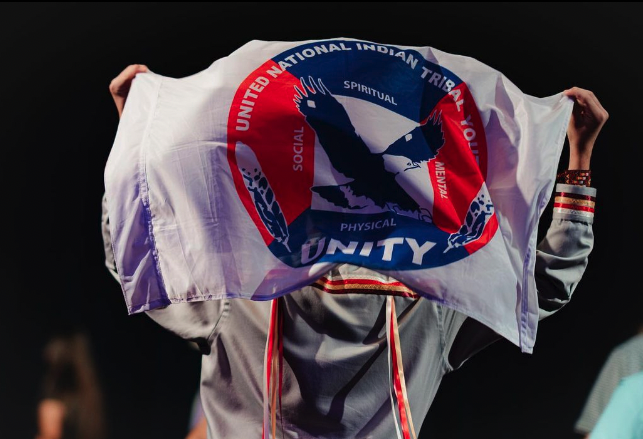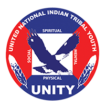
In a historic moment during the National UNITY Council’s (NUC) business meeting in Portland, Oregon, Native youth leaders from over 300 youth councils came together to identify and adopt the Top Ten Issues facing Native youth for 2024-25. These issues reflect the most pressing challenges experienced by Native communities nationwide and serve as a call to action for collective impact and meaningful change.
UNITY’s model goes beyond identifying problems—it provides Native youth with the tools, resources, and training to take a solution-based approach. By addressing these challenges through grassroots community service projects, Native youth leaders are empowered to make a tangible difference in their communities.
The Top Ten Issues Facing Native Youth (2024-25)
- Substance Abuse
- Suicide
- Education/School Dropout
- Missing & Murdered Indigenous Relatives (MMIR)
- Single-Parent Households
- Bullying/Gossiping
- Lack of Cultural Identity
- Unhealthy Relationships
- Blood Quantum
- Lack of Positive Role Models
Empowering Youth to Create Change
UNITY is more than a platform for dialogue; it is a training ground for transformation. Through targeted workshops, hands-on activities, and peer mentorship, UNITY equips youth leaders with the skills they need to address the top ten issues head-on. These trainings focus on leadership development, strategic planning, and problem-solving, ensuring participants leave with the tools to turn their ideas into impactful community projects.
Each youth council is empowered to host four community service projects annually, creating ripple effects of change throughout their regions. These projects embody UNITY’s solution-based approach, addressing the most common challenges Native youth face while inspiring others to succeed and feel seen. By fostering a culture of action and accountability, UNITY sets the stage for national movement-building rooted in the strengths and resilience of Native youth.
Suggested Community Service Projects for Each Issue
1. Substance Abuse
- Host substance abuse prevention workshops featuring stories of recovery from community members.
- Organize youth-led campaigns to promote healthy alternatives such as sports, arts, and cultural activities.
- Partner with local health clinics to provide free drug education and counseling services.
- Create safe spaces for youth to discuss substance abuse challenges and support one another.
2. Suicide
- Coordinate community healing circles focused on mental health awareness and suicide prevention.
- Distribute culturally relevant mental health resource guides at schools and tribal centers.
- Work with local therapists or counselors to host “check-in” sessions for youth.
- Develop peer mentorship programs to build supportive networks among Native youth.
3. EducationAL DISPARITIES OR School Dropout
- Launch after-school tutoring programs for students in need of academic support.
- Organize motivational speaking events featuring Native professionals and college graduates.
- Develop youth-to-youth workshops on time management, goal setting, and college readiness.
- Advocate for funding to provide scholarships and grants for Native students.
4. Missing & Murdered Indigenous Relatives (MMIR)
- Host community walks or runs to raise awareness about MMIR.
- Partner with local law enforcement and advocacy groups for workshops on safety and prevention.
- Create and share educational materials on MMIR to promote vigilance and solidarity.
- Organize art installations or vigils to honor MMIR victims and their families.
5. Single-Parent Households OR GENERATIONAL POVERTY
- Offer parenting workshops to provide resources and support for single parents.
- Organize youth activities that ease the burden on single-parent families, such as childcare services during events.
- Develop mentoring programs to connect children from single-parent households with role models.
- Partner with food banks and charities to provide essential resources to single-parent homes.
6. Bullying AND Gossiping
- Create anti-bullying campaigns highlighting respect, empathy, and cultural teachings.
- Host workshops on conflict resolution and positive communication.
- Start a peer-led initiative where students commit to fostering inclusivity and kindness.
- Develop theater or video projects that depict the effects of bullying and promote understanding.
7. Lack of Cultural Identity OR ACCESS TO CULTURAL RESOURCES
- Organize cultural workshops on traditional arts, language, and storytelling.
- Host intergenerational events where elders share their wisdom and cultural knowledge.
- Create youth programs focused on learning and practicing tribal traditions.
- Start a cultural exchange program with other Native communities to celebrate diversity.
8. Unhealthy Relationships AND ABUSE
- Offer workshops on healthy relationship dynamics and conflict resolution.
- Partner with local organizations to provide resources on dating violence prevention.
- Develop peer discussions focused on identifying and addressing toxic behaviors.
- Host role-playing activities to teach assertiveness and boundary-setting.
9. Blood Quantum OR LACK OF belonging
- Host informational sessions to educate youth about the history and implications of blood quantum policies.
- Organize forums to discuss alternative ways to preserve tribal identity and membership.
- Develop art projects that celebrate tribal heritage beyond blood quantum measures.
- Advocate for tribal leaders to consider inclusive membership practices.
10. Lack of Positive Role Models
- Invite Native professionals and leaders to speak at schools and youth events.
- Establish a mentorship program pairing younger youth with community leaders.
- Create a digital platform to showcase Native success stories and achievements.
- Organize volunteer opportunities where youth can engage with inspiring individuals.
A Call to Action
UNITY’s adoption of these Top Ten Issues is more than a statement—it is a roadmap for action. By hosting community service projects rooted in these issues, Native youth councils transform challenges into opportunities for growth, unity, and empowerment. Each project serves as a stepping stone toward a brighter future in which Native youth feel seen, supported, and capable of creating meaningful change.
This solution-based approach embodies UNITY’s mission to uplift Native youth through collective impact. As the largest and oldest Native youth-serving nonprofit, UNITY inspires hope by equipping young leaders to tackle the issues that matter most. Through collaboration, strategic planning, and peer mentorship, Native youth are addressing today’s challenges and building a stronger, more resilient tomorrow.

